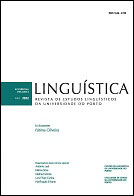Brief considerations on collective nouns in European Portuguese
Abstract
In this article we will address the issue of collective nouns in European Portuguese, focusing our attention on collective nouns that denote organized groups of humans. We will begin by questioning the definition of collective nouns, introducing, for this purpose, a distinction between collective reference and a general sense of group. Then we will explore the variability that characterizes collective nouns through the application of some grammaticality tests. Further on, we will argue that a collective noun can be interpreted not only as a single collective entity, as proposed by Raposo (2013), but also as a plural entity (Ritchie 2018), which grant access to the atoms that constitute it. Finally, we will present two semantic problems involving collective nouns. First, we will discuss the relationship that can be established between collective nouns and certain proper nouns. Second, a comparison between collective nouns and some other plural expressions will be explored. In short, we will defend collective nouns as entities that, in a unique way in relation to other nouns and nominal expressions, introduce a collective reference in discourse.
Downloads
Published
Issue
Section
License
Copyright (c) 2022 Linguística: Revista de Estudos Linguísticos da Universidade do Porto

This work is licensed under a Creative Commons Attribution-NonCommercial 4.0 International License.



